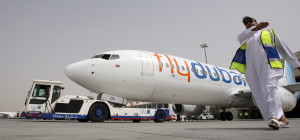By Martin Rivers
Flydubai, the short-haul affiliate of Emirates Airline, became the latest international carrier to add Somalia to its network in March, when it launched a four-times weekly service to Hargeisa, the capital of the semi-autonomous republic of Somaliland.

Ethiopian Airlines and Turkish Airlines launched services to Somaliland and Mogadishu respectively in 2012, gradually upping capacity with higher frequencies and larger planes as demand snowballed. Meanwhile, Qatar Airways is among the major carriers now evaluating a route launch.
As a litmus test for Somalia’s economic prospects, improved connectivity can only be good news for the country and its citizens. Yet it could be a double-edged sword for local airlines that flourished by braving the skies when foreign operators were nowhere to be seen.
“We were the lifeline of the people,” says Mohammed Ibrahim Yassin, the chief executive of Daallo Airlines, founded in Djibouti in 1991, the same year Somalia slipped into civil war. “There was a time when there were no money transfers, no telephones, no postal system – we were everything for the country. We were the link to the outside world. We transported not only people, but goods, money, medicine.”
Together with Jubba Airways and African Express Airways, Daallo has provided war-weary Somalis an alternative to risky ground transportation through years of clan warfare, al-Shabaab threat and foreign military interventions. Though these airlines’ fleets and route networks are modest by global standards, they are big enough to offer connectivity with regional hubs such as Nairobi and Dubai – facilitating onward travel for Somali businesspeople, and opening a sky corridor for the country’s widely spread diaspora.
Yassin describes Daallo’s financial performance as “quite healthy”, noting that the airline could not have survived without a commercially viable business model. “The government doesn’t have the money,” he stresses, when asked if the company has ever received subsidies. “In Somalia and Somaliland, it’s the private sector that is the major vehicle of the economy.”
Safety in numbers
However, as more foreign operators enter Somali skies, the nature of the competitive threat that Daallo faces is changing. All three major international carriers now flying to Somalia are partly or fully government-owned. Flydubai’s big brother, Emirates, is one of three Gulf carriers accused by US airlines of receiving $42bn in anti-competitive state support. Though popular with the travelling public, excessively cheap tickets could spell the death knell for airlines such as Daallo that must stand on their own two feet without government aid.
Pre-empting this threat, Yassin has teamed up with his one-time rival, Abdullahi Warsame, the managing director of Jubba, to merge operations under the umbrella of a new holding company, Africa Aero Alliance.
This would have been unthinkable 10 years ago when the two carriers fought fiercely for domestic market share. But today, consolidation now seems a logical response to an onslaught by deep-pocketed, well-organised foreign rivals.
“Competitive pressure is there, but also more than that it’s a matter of maturity,” Yassin explains. “We have been operating for the last 24 years. We have realised that Africa really needs a different way of playing the game of competition…It’s not that easy to finance aircraft in Africa, but by mobilising resources locally among the people, by putting our forces together, we have an alternative way. This is what we have realised after so long, and that’s the reason we are taking this step.”
From a passenger’s perspective, there will be few obvious changes at first. The combined fleet of two Airbus A321s, two Boeing 737s and one BAe 146 will be repainted with the logo of Africa Aero Alliance, albeit while retaining the Jubba and Daallo brands in smaller writing. Both carriers will continue to market their own distinct travel services.
But, behind the scenes, synergies have been accruing since 1st March, when the integration formally began and a share swap brought the owners together. Codeshare agreements now allow both airlines to sell tickets on each other’s flights, thereby optimising capacity management and keeping the planes as full as possible. Flight schedules are being timed to offer complementary, rather than cannibalistic, services. And negotiations over the procurement of two ATR 72s will be strengthened by the greater purchasing power that a larger company commands.
The hunt for economies of scale has even motivated Yassin to look beyond Daallo’s home markets of Somalia and Djibouti. These two countries, he notes, are not alone in their aviation handicap. Several other central and east African nations also suffer from under-developed air transport sectors.
“The objective of this merger is to create a bigger alliance for African carriers. Daallo and Jubba are the first airline members, but we are looking to expand the alliance across Africa,” says Yassin, identifying Chad and Uganda as two countries being evaluated. “The company will expand to some countries which don’t have national carriers, or are under-served…There is already interest coming from small carriers from different places.”
Despite talking up his long-term ambitions, Yassin is keeping his feet on the ground in the early stages of the partnership. Expansion by the Somali units will initially be cautious, focussing on Addis Ababa in Ethiopia, Entebbe in Uganda and perhaps some points in Yemen once that country stabilises. Optimisation of the regional network will then give way to gradual fleet modernisation, followed eventually by the resumption of Daallo’s European flights to London and Paris.
The airline boss has no interest in hyping up Somalia’s recovery from two decades of debilitating civil war. To the contrary, he cautions that there is “a very, very long way to go” before Somalia can function as a normal member of the global community of nations.
But with foreign airlines sniffing around emerging markets in Africa – and not always competing fairly when they find them – Daallo and Jubba have acted decisively to protect their slice of the pie. ‘Safety in numbers’ is the maxim. And in civil aviation history, it has typically been a wise one.
Source:African Business


